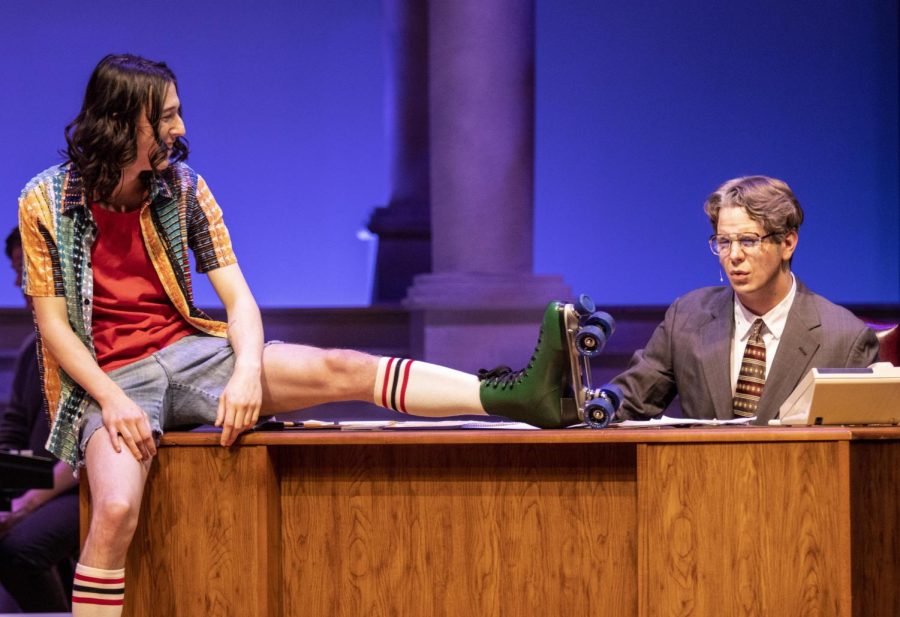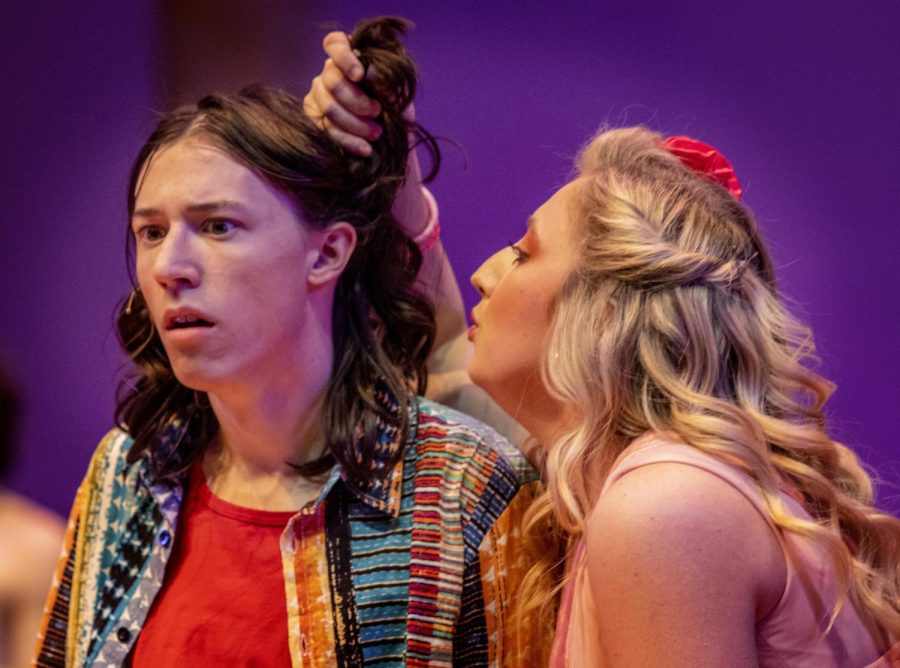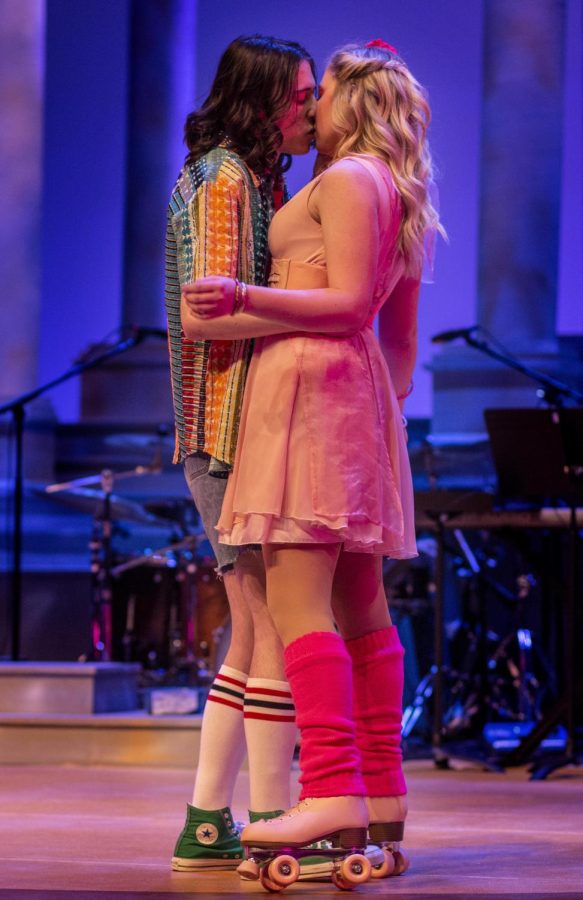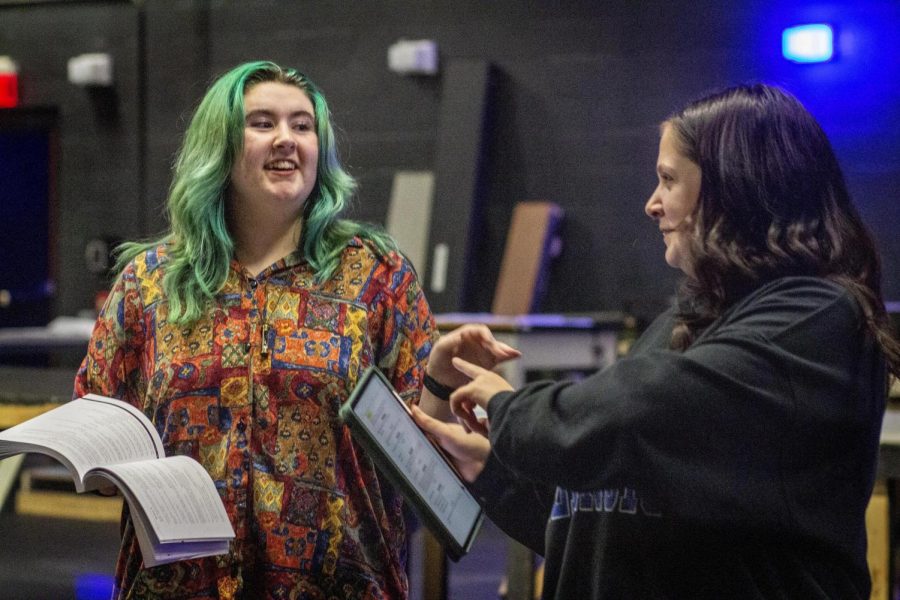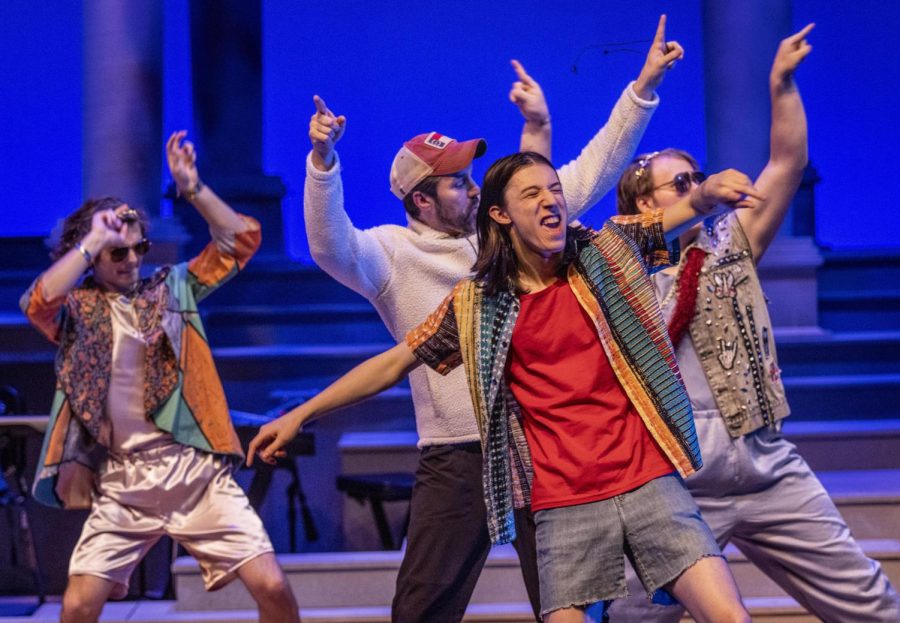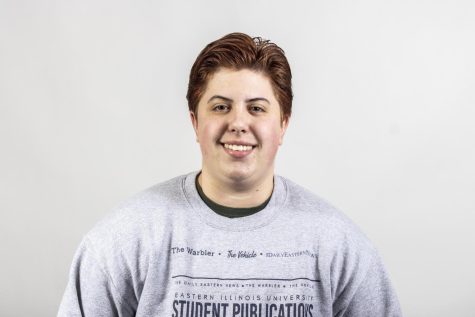An in-depth examination of “Xanadu”
Truth in camp: student cast, crew work to present comedy musical “Xanadu”
From right, Mitchell Cox (Danny), a freshman theatre major, criticizes Benjamin Woolery (Sonny), a rehearsal theatre major, for wearing roller skates to a business meeting during rehearsal for “Xanadu” Sunday evening in The Theatre.
March 1, 2023
Everybody wants “Xanadu.”
That’s according to Larry Cox, an instructor of musical theater and director for this spring’s musical at the Doudna Fine Arts Center.
The cast of Eastern’s production of “Xanadu” has been rehearsing from the very first week of the Spring 2023 semester, though auditions and other preparations for the show began even earlier.
Cox had the cast use the “Stanislavski technique”: each actor should keep in mind their character’s objectives in the scene and throughout the show to determine how they would act or react in different situations.
In this case, each character wants “Xanadu,” a mysterious reward promised by the god Zeus which manifests as a roller disco location in Venice Beach in the 1980’s.
Cox also emphasized a need to play the roles naturally, despite the over-the-top comedic tone of the show. He said that if the characters knew they were being silly, the humor would not work the same way.
“Even though this whole musical is campy, it has to be truthful,” Cox said.
The stage production is based on an infamous movie by the same name. The blend of disco culture, ancient Greek mythology and over-the-top dance sequences is considered one of the worst movies of all time, but the play aims to provide a more structured plot and a sense of self-awareness.
Christiana Harkulich, a theater arts instructor, is the dramaturge for Eastern’s production.
The dramaturge’s role can change somewhat depending on the play, but in this case Harkulich’s job is primarily providing historical and cultural context both for Venice Beach and for ancient Greece.
“I’m trained as a theater historian to dig into ‘How does this play get made? How can I help bring this alive?’” Harkulich said. “Not necessarily through choreography or staging or acting, but all of these additional bits of information and questions that help make it more real.”
The dramaturge “package” for this “Xanadu” included everything from pronunciation for character names to references for how Greek art depicts the nine Muses posing to background information on Electric Light Orchestra, the band which created a lot of the music for the show.
Overall, a dramaturge’s goal is to confirm whether practical decisions made by cast and crew make sense to a person who is knowledgeable about the story and setting. Harkulich said the dramaturge is often described as “the first audience.”
“I don’t have to think as carefully about, ‘Well, they’re going to need to exit stage left and put on a new costume and enter stage right,’” Harkulich said. “I can think about the story.”
Harkulich even found home videos from the ‘80s of people roller skating to give the cast a sense of “what it was like to be in this place.”
“You can basically people watch into the past, which is really fun,” Harkulich said. “I think that’s helped them a lot to think about sort of the freedom and the body language.”
Before this semester, most of the cast didn’t even know how to skate, including junior music education major Becca Geffs, who was cast to play Clio/Kira and skates almost the entire show.
For their second rehearsal, the cast met at a roller rink. They began practicing choreography on skates almost immediately thereafter.
Skating added an extra level of chaos to rehearsals as actors slid past where they wanted to stop or even took some falls.
Geffs later said that the learning process wasn’t as bad as she originally feared, despite recovering from some bumps and bruises earlier in the semester.
Even actors who don’t skate for much of the show had plenty of choreography to learn.
While she didn’t write the dances, freshman vocal music education major Monica Alifantis had the job of helping the rest of the cast learn and refine their moves.
Alifantis used her experiences dancing throughout her life and with Eastern’s Pink Panthers dance team in her role as dance captain for “Xanadu.”
“It was challenging, getting over that first hump of difficult choreography and working that out. But then once you get it, it’s so rewarding,” Alifantis said. “Seeing them [the cast] get it was really fun.”
Along with bigger elements like the choreography, music and script, actors practiced the different ways their characters would speak.
For example, the muses learned a “Juilliard accent.”
“Where is Juilliard?” Cox asked the cast at an early rehearsal when they were beginning to learn the tone.
“I don’t know, I’m going to EIU,” one answered.
The cast worked with a vocal coach to learn that refined, artistic tone. Geffs also learned an Australian accent for her role as Kira.
Benjamin Woolery, a freshman theater major playing the role of Sonny, was given “homework” of watching surfer movies to emulate the characters’ accent and attitude.
For some actors, different accents or different motivations helped them portray multiple roles.
Chloe Hempel, a sophomore vocal music education major, plays three different roles in the show: the muse Erato, the goddess Hera and the god Eros, the Greek counterpart to Cupid.
Hempel says that she plays Erato as “always down to have a good time,” Eros as “stupidly excited to be there” and Hera as a Scorpio.
Even though her role as Hera only lasts for one scene, Hempel learned about her mythology and relationships to other Greek figures in order to understand the character better.
Karrin Estes, a junior vocal music education major, plays Melpomene, the main villain of “Xanadu.” She describes the character as “polar opposite” to herself and says that makes her fun to play.
“It actually challenged me a lot to figure out how I present myself and separate that from the character because I haven’t taken any acting classes,” Estes said. “Cultivating the character itself has been a pretty big challenge, but very rewarding at the same time.”
This isn’t Estes’ first time on stage, though; she has been a long-time participant in community theater and even directed some shows for younger actors. She was also involved in last year’s production of “Little Women,” and says that “Xanadu” is different because the cast skews younger than her rather than older.
“We were on the same things but in a different approach based on you know, the needs of the cast in an educational setting,” Estes said. “Everyone was a lot more inexperienced, which isn’t a bad thing. It’s actually refreshing to see everyone almost starting from the same slate.”
Like any theatrical production, “Xanadu” created challenges for the cast and crew as they tackled a script that most of them had not produced before.
The time commitment created challenges for some students off stage as well. “Xanadu” rehearsals ran six days a week, for at least two hours on weekdays and 10 a.m. to 4 p.m. on Saturdays.
During tech and performance weeks, rehearsals could go even longer as the cast and crew handled logistics with costume changes, props and sound and light cues.
Hempel said that she has to keep her job for financial reasons, but balancing school, work and theater made it difficult to find personal time.
“I’m always on the go,” Hempel said. “I have classes at 9 a.m. and then I have rehearsal to like 8:30 or 9 o’clock so it’s a lot, but very rewarding at the same time because I learned a lot about myself while doing the show.”
Even with long rehearsals and stress as opening night drew closer, laughter still filled the theater whether the humor was coming from real conversations or the script.
“It’s been surprising because usually you get used to the jokes and you stop laughing,” Alifantis said. “But I still laugh at them because I feel like each time like an actor will bring something different or an actress will bring something different. It’s funny to watch the cast grow together.”
“’Xanadu’ is one of those shows where you walk in not knowing what to expect,” Estes said. “I just hope that everyone enjoys seeing it as much as we enjoyed creating it.”
Tickets for “Xanadu” can be purchased from the Doudna Fine Arts Center. Performances are to be held at 7:30 p.m. March 2-4 and at 1 p.m. March 5.
Luke Taylor can be reached at 581-2812 or at lrtaylor@eiu.edu.








![[thumbnail edition] Assistant Coach of the Linebackers, Rodman Noel talking to the linebackers about their positions at O'Brien Field on the Eastern Illinois University campus, Charleston Ill.](https://www.dailyeasternnews.com/wp-content/uploads/2025/04/FB_24_O-1-e1744671213207-1200x609.jpg)



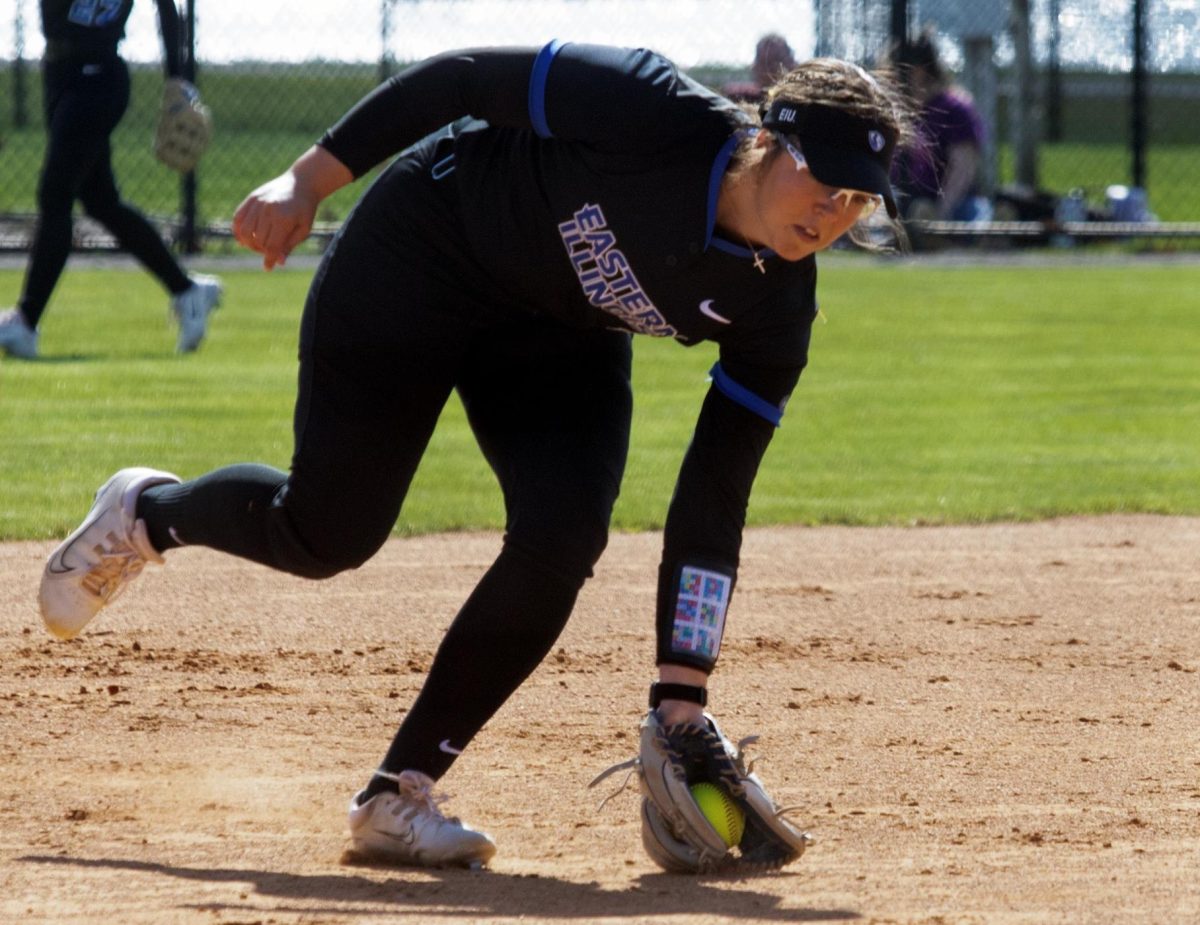

![[Thumbnail Edition] Charleston High School sophomore Railyn Cox pitches the ball during Charleston's 8-7 win over Flora High School on Monday, March 31.](https://www.dailyeasternnews.com/wp-content/uploads/2025/04/SBHS_01_O-1-e1743982413843-1200x1023.jpg)


![[Thumbnail Edition] Senior Foward Macy McGlone, getsw the ball and gets the point during the first half of the game aginst Western Illinois University,, Eastern Illinois University Lost to Western Illinois University Thursday March 6 20205, 78-75 EIU lost making it the end of their season](https://www.dailyeasternnews.com/wp-content/uploads/2025/03/WBB_OVC_03_O-1-e1743361637111-1200x614.jpg)












![[THUMBNAIL EDITION] (From left to right) Head football coach Chris Wilkerson works with his son student assistant coach Peyton Wilkerson at football practice at O'Brien Field on the Eastern Illinois University campus on Thursday.](https://www.dailyeasternnews.com/wp-content/uploads/2025/04/FB_25_O-1-e1744234837107-1200x596.jpg)






































